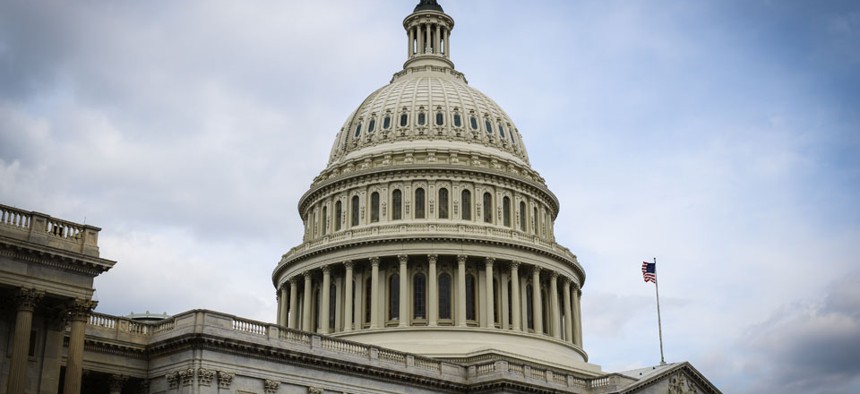
Brandon Bourdages/Shutterstock.com
Bill to Limit Fed Bonuses Clears House Panel
Right to record any phone call with a fed also passes without Democrats' support.
The House oversight committee passed a slew of mostly Republican-sponsored bills Wednesday affecting federal employees and agencies, including a measure to limit bonuses for workers.
The Common Sense in Compensation Act, introduced by Rep. Mark Meadows, R-N.C., would limit bonuses for rank-and-file federal employees to 5 percent of their base salaries. It also allows no more than one-third of Senior Executive Service employees to receive bonuses at any given agency. The limitation would only exist while sequestration -- a ten-year program, as laid out in current law -- is in effect.
“These bonuses exemplify Washington’s spending problem,” Meadows said during the House Oversight and Government Reform Committee’s markup of the bill. “It’s time to stop furloughing employees who depend on their paycheck from week to week while awarding hundreds of thousands of dollars in bonuses to senior employees.”
Democrats opposed the bill, saying federal employees have taken the brunt of too many cuts.
“If it were purely standing on its own merits,” said Rep. Gerry Connolly, D-Va., “it may make sense in tough times. But it has to be seen in the context of the relentless assault on federal employees by the majority in the 112th Congress and this one.”
Connolly added that taking away incentives such as bonuses is an unsound business move when the government is asking its workers to do more with less. Meadows dismissed the complaint, saying bonuses have become so saturated -- 75 percent of SES employees received a bonus in fiscal 2011, he said -- they no longer possess incentive qualities. The committee eventually passed the bill -- with the stipulation it only take effect when an agency is negotiating a new collective bargaining agreement -- along a party line voice vote.
The committee approved another major bill for federal workers, the Government Employee Accountability Act, which passed the House in the last Congress but died in the Senate. The legislation would allow agencies to place Senior Executive Service employees on unpaid leave for up to 180 days if they are accused of misappropriation of funds or other job-related misconduct.
Committee Democrats took issue with a provision in the bill that would enable agency heads to terminate an employee under investigation, claiming it unfairly eliminates due process. Committee chairman Rep. Darrell Issa, R-Calif., introduced an amendment that would require a review period and give the employee rights to appeal the decision to the Merit Systems Protection Board. Ranking Member Elijah Cummings, D-Md., still would not support the bill, however, saying it “retains the policy of fire first and ask questions later.”
The committee also approved a bill to allow citizens to record any conversation with federal employees acting in an official capacity. The Citizen Empowerment Act -- introduced by Rep. Lynn Jenkins, R-Kan. -- allows individuals to record the conversations without direct permission from the federal worker.
“Participation by an employee, acting in an official capacity, in an in-person or telephonic interaction shall constitute consent by the employee to a recording of that interaction by any participant in the interaction,” the bill reads.
While Democrats once again expressed concerns, Issa said a federal employee forfeits some rights afforded to regular citizens.
“When you make a phone call on behalf of the federal government, as a federal employee, the federal government is calling, an individual is not calling,” Issa said.
The Government Customer Service Improvement Act, which the House backed in the last Congress but without enough time for the Senate to take it up, achieved bipartisan support in passing the committee. The bill would direct the Office of Management and Budget to create governmentwide standards for customer service, including targets for response times to emails, phone calls and letters, as well as benefits processing and payment allocation.
Other bills moved forward by the committee included efforts to reduce duplicative programs in government and limiting the “excessive federal rules and regulations.”
All bills now face a vote on the full House floor.
(Image via Brandon Bourdages/Shutterstock.com)
NEXT STORY: Small Perks Proposed for Beleaguered Feds







